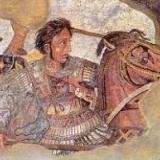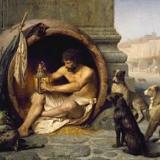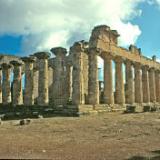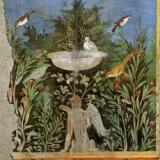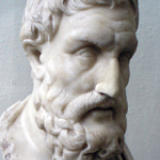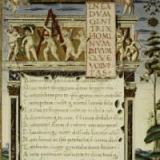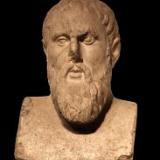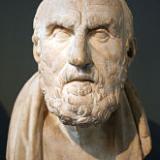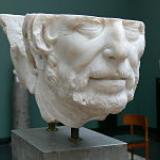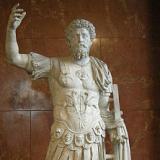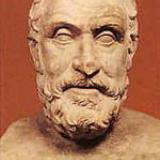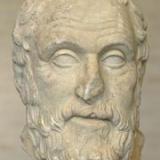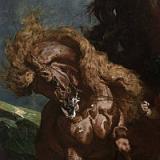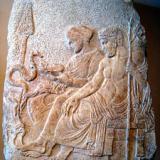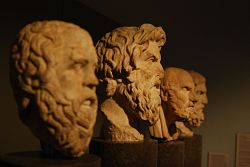Hellenistic Philosophy
In these episodes, Peter considers the contribution of the main schools of the Hellenistic age: the Stoics, Epicureans, and Skeptics, and also discusses their reception in the Roman empire. Minor schools like the Cynics and Cyrenaics are also included. With interviews from James Warren, David Sedley, John Sellars, Raphael Woolf, A.A. Long and R.J. Hankinson.
The book version of these podcasts is available from Oxford University Press.
A good place to start, with helpful texts and commentary is:
• A.A. Long and D.N. Sedley, The Hellenistic Philosophers (Cambridge: 1987), vol. 1: translations and commentary, vol.2: texts.
See also:
• K. Algra et al (eds), The Cambridge History of Hellenistic Philosophy (Cambridge: 1999).
Posted on
Peter introduces the Hellenistic philosophical schools – the Cynics, Epicureans, Stoics, and Skeptics – and asks how they responded to earlier thinkers.
Posted on
In this episode we unleash the most outrageous ancient philosophers, Diogenes and the Cynics, and their quest to “deface the currency” by exposing the hypocrisy of Greek society.
Posted on
Peter considers Aristippus and the Cyrenaics, a group of hedonistic philosophers who were in touch with their feelings… but nothing else.
Posted on
Peter begins to examine the philosophy of Epicurus, focusing on his empiricist theory of knowledge and his atomic physics.
Posted on
Epicurus is infamous for thinking that pleasure is the good. But surprisingly, he says the highest pleasure is mere absence of pain. In this episode, Peter enjoys the challenge of trying to understand why.
Posted on
Peter considers Epicurus’ attempt to dispel the fear of death and the gods, and along the way looks at the topics of soul, atheism, and philosophy as therapy.
Posted on
Lucretius’ poem On the Nature of Things sets Epicureanism into verse. Peter takes a look at its treatment of the soul, free will and the swerve and human society.
Posted on
James Warren of Cambridge University talks to Peter about Epicurus, his atomism, his hedonism and the Epicurean arguments against the fear of death.
Posted on
Peter arrives at the most influential of the Hellenistic schools, the Stoics, focusing on the early school from Zeno to Chrysippus, and on Stoic innovations in logic.
Posted on
The Stoics think there could be a perfect sage, so wise that he is never wrong. Is this a big mistake? Peter investigates their epistemology to find out.
Posted on
Peter looks at the Stoic idea of god, a providential fire that pervades nature, and considers their idea of a deterministic and eternally recurring cosmos.
Posted on
Peter considers two of the Stoics’ most challenging ideas, a determinism that leaves room for moral responsibility, and the ideal of an ethically perfect sage.
Posted on
David Sedley of Cambridge University chats with Peter about the development of the Stoic school, from the early days to the imperial age.
Posted on
Peter starts to explore the Roman Stoics, beginning with Seneca and the Stoic attitude towards the emotions.
Posted on
The greatest of the Roman Stoics is Epictetus, arguably the first thinker to discuss the nature of human will, and author of some of the most powerful and demanding ethical writings in history.
Posted on
The life and thought of Marcus Aurelius, Roman Emperor and author of the classic text of Stoic self-examination, the Meditations.
Posted on
Peter chats about Seneca, Marcus Aurelius, and Epictetus with John Sellars, an expert on Roman Stoicism and the reception of Stoicism in the early modern era.
Posted on
Peter turns to the final major Hellenistic school, the Skeptics, beginning with Pyrrho and the question of how ancient skepticism compares to modern skepticism.
Posted on
Under Arcesilaus and Carneades, Plato’s Academy took a skeptical turn, casting doubt on the possibility of knowledge. But was their skepticism skeptical enough?
Posted on
Cicero’s philosophical works are invaluable records of Hellenistic thought. But what kind of philosopher was Cicero himself?
Posted on
Peter talks to Raphael Woolf about the method and philosophical allegiance of Cicero, focusing on the work On Ends (De Finibus).
Posted on
Sextus Empiricus, the last great ancient skeptic, expounds a radical branch of the tradition called Pyrrhonism. Peter raises some doubts about how to interpret him.
Posted on
Leading Hellenistic philosophy scholar Tony Long talks to Peter about the self, ethics and politics in the Stoics, Epicureans and Skeptics.
Posted on
The ancient relationship between medicine and philosophy culminates in Galen, who passes judgment on the three main “sects”: rationalism, empiricism and methodism.
Posted on
Jim Hankinson, a leading expert on philosophical themes in Galen, joins Peter to discuss this greatest doctor of the ancient world.




